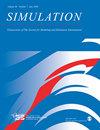A quantitative simulation–based modeling approach for college counseling centers
IF 2
4区 工程技术
Q4 COMPUTER SCIENCE, INTERDISCIPLINARY APPLICATIONS
Simulation-Transactions of the Society for Modeling and Simulation International
Pub Date : 2022-06-03
DOI:10.1177/00375497231159675
引用次数: 1
Abstract
College counseling centers in various universities have been tasked with the important responsibility of attending to the mental health needs of their students. Owing to the unprecedented recent surge of demand for such services, college counseling centers are facing several crippling resource-level challenges. This is leading to longer wait times which limit access to critical mental health services. To address these challenges, we construct a discrete-event simulation model that captures several intricate details of their operations and provides a data-driven framework to quantify the effect of different policy changes. In contrast to existing work on this matter, which is primarily based on qualitative assessments, the considered quantitative approach has the potential to lead to key observations that can assist counseling directors in constructing a system with desirable performance. To demonstrate the benefit of the considered simulation model, we use data specific to Texas A&M’s Counseling & Psychological Services to run a series of numerical experiments. Our results demonstrate the predictive power of the simulation model, highlight a number of key observations, and identify policy changes that result in desirable system performance.基于定量模拟的高校心理咨询中心建模方法
各高校的心理咨询中心肩负着满足学生心理健康需求的重要责任。由于最近对此类服务的需求空前激增,大学咨询中心面临着几项严重的资源挑战。这导致等待时间延长,限制了获得关键精神卫生服务的机会。为了应对这些挑战,我们构建了一个离散事件模拟模型,该模型捕获了其操作的几个复杂细节,并提供了一个数据驱动的框架来量化不同政策变化的影响。目前关于这个问题的工作主要以定性评价为基础,与此相反,经过考虑的定量方法有可能产生关键的观察结果,帮助咨询主任建立一个具有理想业绩的系统。为了证明所考虑的模拟模型的好处,我们使用了德州农工大学咨询与心理服务中心的特定数据来运行一系列数值实验。我们的结果证明了模拟模型的预测能力,突出了一些关键的观察结果,并确定了导致理想系统性能的策略更改。
本文章由计算机程序翻译,如有差异,请以英文原文为准。
求助全文
约1分钟内获得全文
求助全文
来源期刊
CiteScore
3.50
自引率
31.20%
发文量
60
审稿时长
3 months
期刊介绍:
SIMULATION is a peer-reviewed journal, which covers subjects including the modelling and simulation of: computer networking and communications, high performance computers, real-time systems, mobile and intelligent agents, simulation software, and language design, system engineering and design, aerospace, traffic systems, microelectronics, robotics, mechatronics, and air traffic and chemistry, physics, biology, medicine, biomedicine, sociology, and cognition.

 求助内容:
求助内容: 应助结果提醒方式:
应助结果提醒方式:


